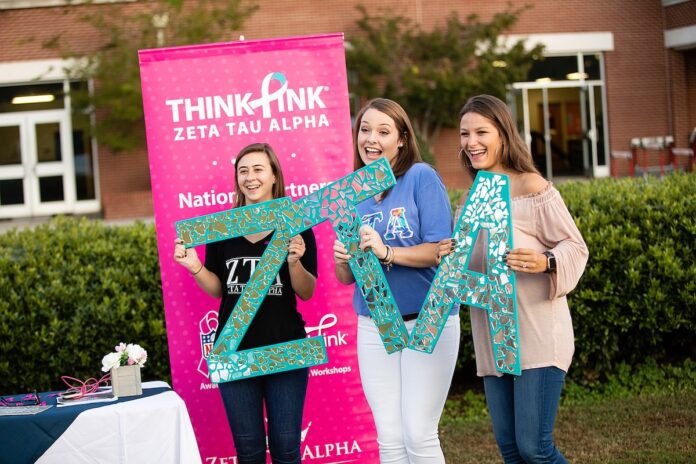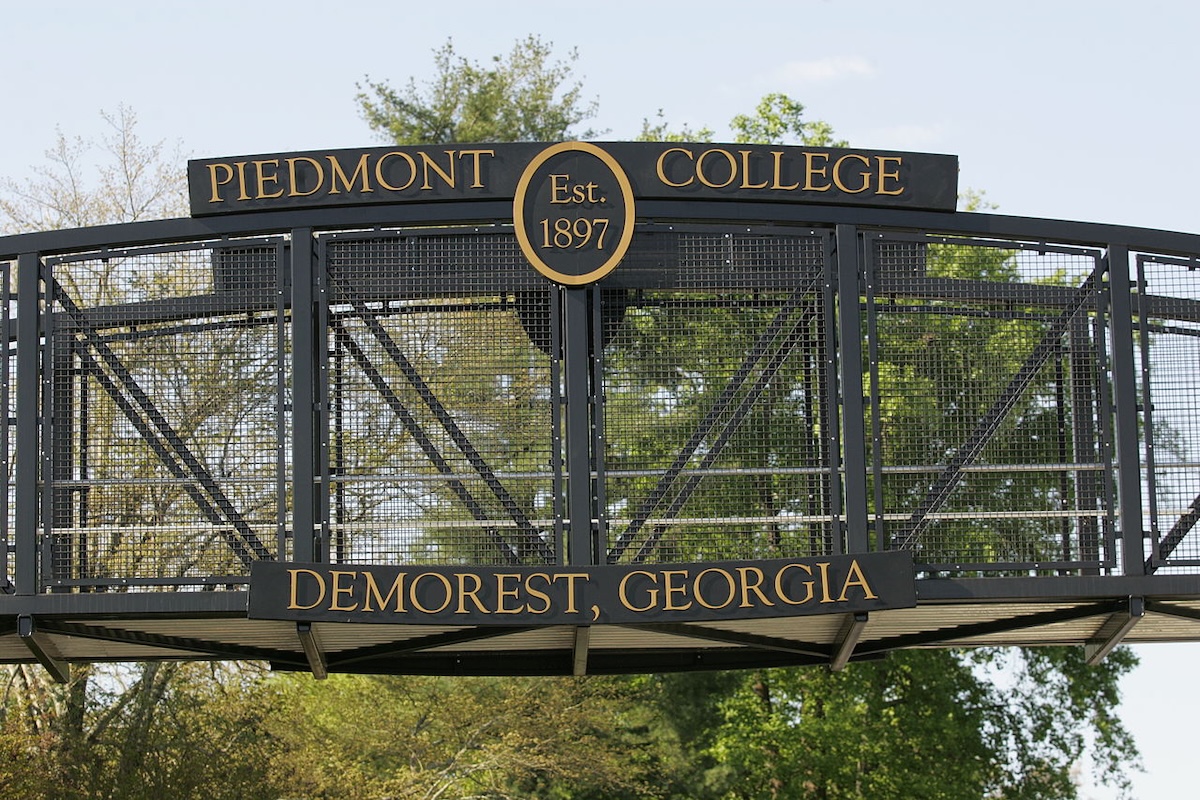
It’s 2:15 PM, and I’m late for my call with Caroline Odom, President of Piedmont University’s Zeta Tau Alpha. My 17-month-old had been resisting arrest (nap), and I am now 15 minutes behind for all of my scheduled appointments. However, Miss Odom, a kind-hearted elementary education major, graciously accepts my apology and proceeds with our call. I can tell she’s pretty by the tone of her voice. I picture clothes purchased from Dress Up and perfect bouncing curls. Then I wonder if this thought is drawn from a well whose waters grew stale in the early 21st century.
After all, I grew up in an era that idealized a certain kind of woman—the one in a brown pencil skirt and sweater vest, the one who “wasn’t like other girls.” This ideal was often promoted at the expense of young women like Miss Odom, who were caricatured as airheaded mean girls, their ambitions reduced to marrying a rich dude named Chad and throwing extravagant poolside parties on their father’s credit card.
This worldview shaped a bias but never crystallized into prejudice, and I push the fleeting
assumption aside as I dive into conversation with Caroline, who, for the record, sports curls so perfect that they would make Sabrina Carpenter jealous.

I explain to her my purpose—to interview and gain a deeper understanding of Greek Life across North Georgia. The first article in a series on the subject.
The Decline of Campus Life
First, we explore the decline in campus participation at universities in 2025, as various factors reshape student engagement. Online learning expands, financial constraints force students to live off campus, and the growing need for part-time jobs limits their ability to immerse themselves in campus life.
The US Department of Education reported that, in 2017, 43 percent of all full-time undergraduate students and 81 percent of part-time students were employed while enrolled, limiting their availability for extracurricular activities.
Furthermore, post-pandemic college experiences have been seemingly permanently altered. Institutions have struggled to revive the vibrant social scenes that once defined the college experience. Student organizations are seeing lower recruitment numbers, and events that once drew large crowds now struggle to attract participants.
Yet, I believe these arguments barely scratch the surface. As a college student at the University of North Georgia (Dahlonega) in 2016, I remember the political atmosphere as electric—an unrelenting firestorm that burned through the rising generation, leaving them parched for isolation and numbness. After all, they came of age in an era where a single reckless text at 15 could cost them a college scholarship at 18.
Greg Lukianoff and Jonathan Haidt, authors of The Coddling of the American Mind, suggest that while Millennials and elder Zoomers indulge in their orgy of activism, vitriol, and division, those with less experience in nuance are the ones reduced to ashes. Better, then, to disappear into the glow of a phone screen, scrolling TikTok on an anonymous account in a darkened dorm room.
Even in 2016, I remember the campus transitioning from a vibrant community to a
post-apocalyptic, barren landscape, with nothing but a sad tumbleweed rolling past on the
weekends. Yet, from Monday through noon on Friday, the University thrummed with motion. In 2025, campus culture pulses with the alacrity of a 50-year-old man, obese and cursed with diabetes and untreated high blood pressure, sustained on a steady diet of donuts and franchise beer.
Inside Zeta Tau Alpha at Piedmont University
Zeta Tau Alpha (Lambda Rho Chapter) at Piedmont University is a prime example of how
sororities foster genuine connection. Unlike the stereotypical exclusivity often associated with Greek life, this chapter offers a lenient rush policy—essentially anyone with the core values can join in any year, though most members enter as freshmen. Miss Odum shares that she never anticipated joining Greek life. Initially focused on sports, she was drawn in by the camaraderie she saw at a recruitment event. Over time, she took on leadership roles, becoming sisterhood chair, then recruitment chair, and eventually president.
“I wanted to be part of the gears, to help new members have the best experience possible,” she explains.
Unlike massive sororities with hundreds of members, the Lambda Rho chapter is small but
tight-knit. “Tiny but mighty,” Caroline describes it, emphasizing that the connections within the group are deeply personal. Traditions such as Bigs and Littles, where new recruits are mentored by experienced members, create lasting bonds. After big events, members gather to decompress together, often over a bowl of chips and dip at the local Mexican restaurant, reinforcing a sense of belonging that extends beyond campus.
The Role of Greek Life in Campus Revitalization
Greek life at Piedmont University plays a crucial role in keeping campus life vibrant. Despite a general decline in engagement writ broad across universities, organizations like Zeta Tau Alpha offer students a structured way to form meaningful relationships. The chapter actively participates in philanthropy, particularly breast cancer education and awareness. Events like “Think Pink Week” and “Pink Out” basketball games bring students together for a common cause.

One common misconception about sororities is the idea that members are simply “paying for friends.” Caroline counters this notion, explaining that dues function more like a co-op—each member contributes to the organization’s events and experiences. “We genuinely make friendships here. No one is forcing it to happen,” she says.
Balancing Leadership, Academics, and Social Life
Sorority membership isn’t just about socializing; it also fosters leadership and professional
development. Caroline, an elementary education major, credits her leadership roles in ZTA with helping her develop conflict resolution skills, time management, and assertiveness. “I used to be a people-pleaser, but being president has helped me find my voice,” she reflects.
Planning events, managing a team, and executing a vision are skills that translate directly to professional settings. Many sorority members become leaders in their fields, whether in business, law, education, or science.
The Future of Community in a Digital Age
As colleges continue to navigate the balance between digital and in-person experiences, Greek life provides a blueprint for rebuilding real-world communities. The key lies in
intentionality—creating spaces where students feel genuinely seen and supported.
For those seeking community in a post-community world, organizations like Zeta Tau Alpha offer a compelling reminder: friendship, mentorship, and shared purpose remain as valuable as ever. As Caroline sums up her experience in three words: “Authentic. Exciting. Sisterhood.”
The future of the community may be shifting, but the fundamental need for belonging remains constant. Regardless of the era, cultivating meaningful in-person relationships will always be vital to individual well-being and the vitality of campus life. Though forming connections can feel risky, it is a risk well worth taking, for it is through these bonds that we find support, purpose, and a deeper sense of community.
(Editor’s Note: This article comes to Now Habersham in partnership with The Cute North Georgian Magazine)






